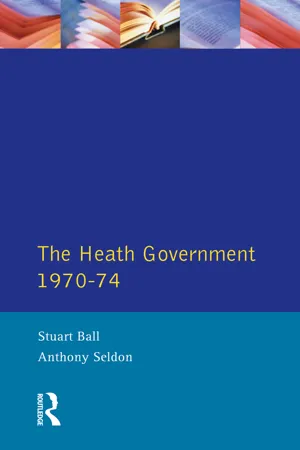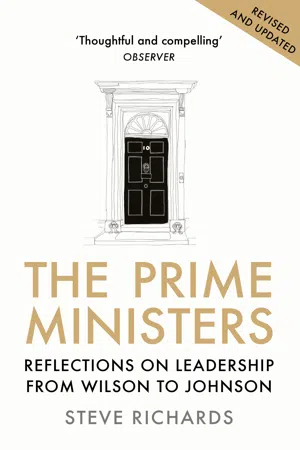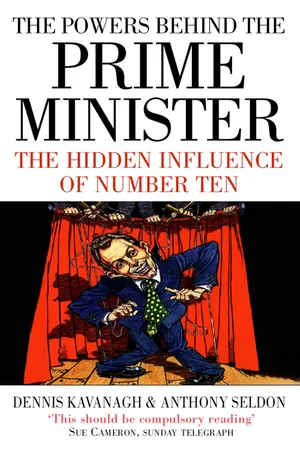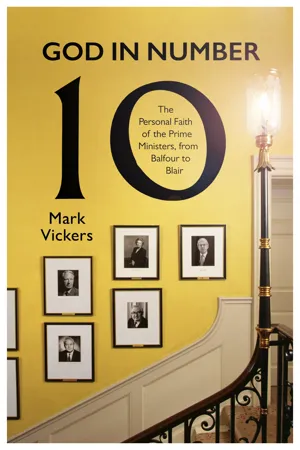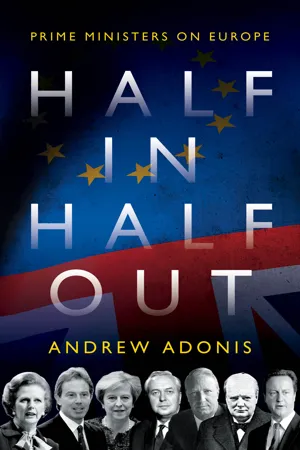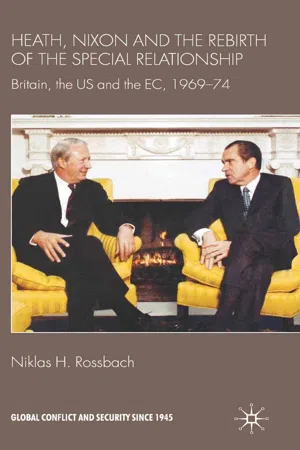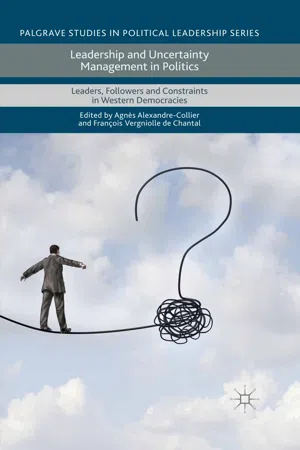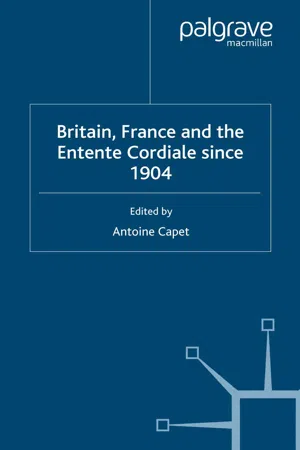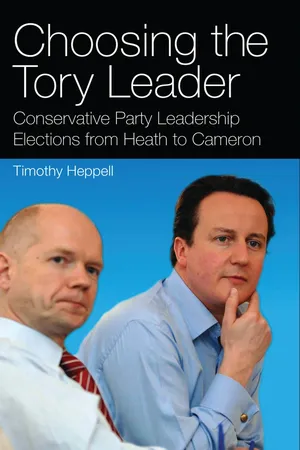History
Edward Heath
Edward Heath was a British politician who served as Prime Minister from 1970 to 1974. He was the leader of the Conservative Party and is best known for taking the United Kingdom into the European Economic Community (EEC) in 1973. Heath's time in office was marked by economic challenges and industrial disputes, and he also played a key role in the Northern Ireland conflict.
Written by Perlego with AI-assistance
Related key terms
1 of 5
10 Key excerpts on "Edward Heath"
- eBook - ePub
The Heath Government 1970-74
A Reappraisal
- Stuart Ball, A. Seldon(Authors)
- 2014(Publication Date)
- Routledge(Publisher)
Chapter One The Heath government in history Anthony SeldonThe Heath government was in office from June 1970 to February 1974 during the main turning point in postwar British history. Five years before it came to power, the Labour government of Harold Wilson set up a Prices and Incomes Board, Tony Crosland’s circular on secondary schooling sought to give comprehensive schools a decisive push and kill off grammar schools, and the National Plan was published. In this ‘old’ world, the state was seen as having a major role as monopoly supplier of many goods and services, trade unions were lauded and powerful, and the pursuit of equality was regarded as a core objective of government. Five years after Heath’s government fell from power, Mrs Thatcher was in Downing Street in 1979, and a new world was shortly to unfold where government itself was no longer considered to be benign, priority was given to boosting private provision at the expense of the collective, and a vast expansion of unemployment and even poverty was openly tolerated. The Heath government is intriguing in part because it promoted elements of both the old and the new worlds and was trapped uneasily as one paradigm was beginning to lose its hold, but the other model had yet to secure intellectual credibility or popular backing. The government’s predicament moreover was compounded as it was in office at a time of unusual unrest and turbulence, both domestically and internationally. Two events in particular occurred in 1973: the ending of the Bretton Woods system, and the first great oil shock, both having profound and lasting repercussions.Rival InterpretationsThe government is fascinating also because it has become such a battleground of rival views and interpretations. Historical assessment of Heath’s government has been clouded by a number of factors. The government’s most decisive and long-lasting initiative was taking Britain into the European Economic Community (EEC). But opinion is sharply divided on whether it was a wise and necessary move, and whether membership benefited Britain. The second difficulty stems from the impact of Thatcherism, the apparent success of which in the 1980s made Heath’s government look wrong-headed and indecisive. Third, the government changed course in several areas mid-term; were those switches wise pragmatism, inevitable, or unprincipled weakness? Finally, Heath as Prime Minister was unusually single-minded: was this very personal style of leadership responsible for the apparent inconsistencies and floundering, or did it result in the government achieving as much as it did in very volatile and difficult circumstances? Four main interpretations of the government present themselves. - eBook - ePub
The Prime Ministers
Reflections on Leadership from Wilson to Johnson
- Steve Richards(Author)
- 2019(Publication Date)
- Atlantic Books(Publisher)
2
Edward Heath
Few leaders were better prepared for the tasks of leadership than Edward Heath by the time he became prime minister in 1970. Heath had flourished in the intense student politics of Oxford University in the 1930s. As a student he had travelled widely in Europe. While rising to the top in politics, his ministerial responsibilities included a demanding negotiation to join the Common Market under the leadership of Harold Macmillan, a test of any potential leader’s stamina and durability. In addition, Heath had been an energetic and reforming Cabinet minister at a point when a tired Conservative government lacked momentum. Earlier, he had been chief whip at a highly sensitive and traumatic period, giving him a developed sense of how the parliamentary party behaved and how to make it behave. He was also the first leader of the Conservative Party to be elected by MPs, an authority-enhancing act of democratic engagement.This was quite a CV for leadership, compared with most other modern prime ministers. Yet, as prime minister, Heath endured a traumatic, dark and brief tenure at Number Ten. His political career ended in terrible failure and a long sulk, as he observed his successor transform the Conservative Party and win landslide elections. How to explain the mismatch between Heath’s considerable qualities and mighty qualifications for leadership with the hell that erupted around him soon after he became prime minister?Such was the enduring sense of failure associated with Heath, his fall and his subsequent transparent grumpiness that these qualities are easily overlooked. They might even seem to relate to an entirely different figure than the one who ruled in troubled times, called an early election and lost. But before being elected leader in 1965, Heath had been an unusually self-confident Cabinet minister. Even more unusual, he left his Cabinet posts with greater self-confidence than he had when he arrived. He made a practical impact, implementing some radical changes with a wilful resolution and buttressed by a clear ‘one nation’ philosophy. Indeed, Heath was the last ‘one nation’ Conservative to lead his party. David Cameron claimed to come from the same tradition, and probably genuinely thought he was, but he was much closer to the Thatcherite model. Heath’s politics lay well to the left of Cameron’s. Although Heath was never as popular as Harold Macmillan, or acquired the same variety of ministerial roles as Rab Butler, who never made it to the top, his career before he became leader comes closest to offering a precise definition of what it was to be a ‘one nation’ Tory – another of British politics’ overused and imprecise terms. - eBook - ePub
- Dennis Kavanagh, Anthony Seldon(Authors)
- 2013(Publication Date)
- HarperCollins(Publisher)
CHAPTER THREE Edward Heath (1970–1974)THE HEATH GOVERNMENT came to office in June 1970 as probably the best prepared of any in postwar history until Tony Blair’s in 1997. Like Blair too, Ted Heath also sought to ‘modernise’ British government. Unlike his Labour counterpart, however, Heath had long experience at the centre of decision making. He had been Chief Whip under Anthony Eden and Harold Macmillan, part of the old ‘magic circle’, and handled big issues such as Europe in 1961–3 under Macmillan, and the abolition of resale price maintenance (RPM) in 1963–64 under Home. He was the first Conservative leader to be educated at a grammar school and the first, in 1965, to be elected in a competitive election. Heath had a keen interest in policy. Under Home’s leadership in opposition he had chaired an ambitious policy review, and as leader after 1965 he retained the key post himself.Like Harold Wilson, Heath spoke about the need for the modernisation of British industry. He regarded this development as essential to meet the challenge of competing with Europe. Heath also promised to run his government in conscious reaction to that of his immediate predecessor, Wilson. In his foreword to the 1970 election manifesto he criticised ‘government by gimmick’. As opposition leader he insisted on shadow ministers speaking to their brief and sticking to their last, a cause of tension for Enoch Powell, who liked to range broadly. Enoch Powell’s famous and fateful ‘rivers of blood’ speech on immigration in 1968 trespassed on the territory of the Home Office and gave Heath his opportunity to dismiss his right-wing foe from the Shadow Cabinet: had he not, four senior colleagues, Quintin Hogg (later Lord Hailsham), Edward Boyle, Lord Carrington and Iain Macleod would themselves have resigned.Heath’s government achieved Britain’s entry to the European Community, the culmination of a personal crusade for the Prime Minister. But the government was challenged by industrial relations disputes, a breakdown of order in Northern Ireland which led to the imposition of direct rule on the province from London, and the bitter reaction to the introduction of far-reaching statutory controls over prices and incomes. Little of this, or the massive rise in the price of raw materials or the quadrupling of oil prices in October 1973, had been anticipated in 1970. Heath’s plan to call a general election on the back of economic prosperity was in ruins. At the end of his tenure as Prime Minister, Heath was exhorting the electorate to prepare for sacrifice. - eBook - ePub
God In Number 10
The Personal Faith of the Prime Ministers, Balfour to Blair
- Mark Vickers(Author)
- 2022(Publication Date)
- SPCK Publishing(Publisher)
Edward Heath (1970–1974)
‘Coming through the valley of bewilderment’Edward Richard George Heath1 was born at St Peter’s-in-Thanet, close to the Kentish coastal town of Broadstairs, on 9 July 1916. He was educated at Chatham House Grammar School, Ramsgate, and Balliol College, Oxford.After service with the Royal Artillery during the Second World War and a variety of positions subsequently, Heath won Bexley for the Conservatives in 1950. He remained an MP until his retirement in 2001. Boundary changes led to the seat being renamed Sidcup in February 1974 and Old Bexley and Sidcup in 1983.Heath served in the Whips’ Office between 1951 and 1959. As Chief Whip from 1956, he helped restore party unity after the Suez crisis. Briefly Minister of Labour, Heath was appointed Lord Privy Seal in 1960, speaking on foreign affairs in the Commons. Entrusted with responsibility for negotiating UK membership of the EEC, Heath was passionately committed to joining as a means of avoiding future conflict and advancing national interests. Veto of the application by the French President, Charles de Gaulle, in no way reflected badly on Heath, and Douglas-Home appointed him President of the Board of Trade in 1963. When the Conservatives lost the 1964 general election he became Shadow Chancellor, organizing an effective campaign against the 1965 Finance Bill.When Conservative MPs elected their party leader for the first time on 27 July 1965, Heath, the meritocratic modernizer, succeeded the aristocrat, Douglas-Home. It did not provide the immediate fillip the Tories hoped for; they were decisively defeated by Harold Wilson’s Labour Party in the 1966 general election. Despite the government’s economic difficulties, Heath’s period as leader of the Opposition was an unhappy time, in which he was frequently outwitted by Wilson on the floor of the Commons. However, he led the Conservatives to a surprise 30-seat majority victory in the election on 18 June 1970 and was appointed Prime Minister the following day. - eBook - ePub
Half In, Half Out
Prime Ministers on Europe
- Andrew Adonis(Author)
- 2018(Publication Date)
- Biteback Publishing(Publisher)
CHAPTER 7Edward Heath
MICHAEL McMANUSThere was a deep-seated belief that, if the rest of Europe could solve its problems on its own, it would no longer be likely to interfere with us in Britain. Alas, this proved to be illusory.’EDWARD HEATH, C. 1990M emories of the perpetually dyspeptic-looking countenance of the senescent Sir Edward Heath help to explain why negative perceptions of him remain stubbornly in place. What he always regarded as his greatest achievement – UK membership of the European Union – became an increasingly poisoned chalice, as his party slowly lost faith in Europe. To a younger generation within his own party – the party he had joined in the 1930s and never deserted until his death in 2005 – he seemed like an angry old dinosaur.Heath’s views originated not only in the scarred, burning battlefields of war during the mainland campaign of 1944–45, but years earlier, during the remarkable experiences he had before the Second World War had broken out. He had witnessed at first hand one of the Nuremberg rallies; visited Spain at the height of its bitter Civil War; and then campaigned against the pro-appeasement Conservative candidate in the Oxford by-election of 1938.Heath spent much of the summer of 1937 in Germany and Austria, including a particularly agreeable time as the guest of a retired professor of English, close to the Bavarian Alps. While there, he received an unexpected invitation to join a British delegation at a Nuremberg rally. In his 1977 memoir, Travels, Heath recalled those formative experiences:Professor Winckler and I talked continuously about the Nazi Party philosophy and Hitler’s intentions during our long walks through the forests or when we were climbing the mountains. Neither of us had any doubt about the nature of the regime and its lack of freedom. What we perhaps did not realise was the extent to which it was already militarily committed to aggression in Europe. That was soon to become evident at Nuremberg … All the voices protesting Germany’s innocence of any ill intent were stilled in my mind as I watched this demonstration of what could only be aggressive power … The finale of the Rally was a party at which Himmler was to be the host … I remember him for his soft, wet, flabby handshake. Goebbels was there, his pinched face white and sweating – evil personified. - eBook - PDF
Heath, Nixon and the Rebirth of the Special Relationship
Britain, the US and the EC, 1969–74
- Niklas H. Rossbach(Author)
- 2009(Publication Date)
- Palgrave Macmillan(Publisher)
In 1965 Heath became leader of the Tory Party. Politically he was at the political centre of his party; a non-ideological issue-oriented politi- cian mostly identified with the question he felt most strongly about, namely membership of the EEC. The pro-European paper The Economist depicted Heath as a man from a humbler background, a modern figure, who saw Britain's future in Europe. 59 In his 1950 Parliamentary maiden 18 Heath, Nixon and the Rebirth of the Special Relationship speech he had argued that Britain should not only support the Schuman Plan but also participate in the integration of coal and steel industries. Part of his rationale was to have Britain as balancer between France and Germany and he came to lament that Britain had lost an opportunity.60 It would, however, be an underestimation of the nature politics, which is subject to contingency, and an overestimation of Heath - the politician- to say that his speech was a prescient statement of his role as British negotiator for EEC membership a decade later, 1961-63. It is actually likely that it was precisely that he was not fanatical about Europe that he was later thought of as suitable as a leader for the negotiations for EEC entry in 1961. 61 Later, after the negotiations were short-circuited by de Gaulle in 1963, Heath declared that Britain was still turned towards Europe. 62 His view was that the right course had been frustrated and that future chances should not be lost due to bitterness. Overcoming the failure became a challenge for Heath. 63 Membership of the EEC seemed also to be the only remaining option open to Prime Minister Macmillan if Britain was to remain a great power. He did not think that the Commonwealth would develop into an alternative market for Britain. - eBook - ePub
Leadership and Uncertainty Management in Politics
Leaders, Followers and Constraints in Western Democracies
- François Vergniolle De Chantal, Agnès Alexandre-Collier(Authors)
- 2015(Publication Date)
- Palgrave Macmillan(Publisher)
15
Edward Heath: The Failed Leadership of an Uninspiring Leader
Laetitia LangloisIntroduction
The question of leadership in contemporary Western democracies is a fascinating subject for the historian as it explores the emergence of a man or woman inside a party and the unique relationship he or she builds with the people. Leadership is commonly associated to Max Weber’s theory of ‘charismatic leadership’ (Weber, 1995) and according to the French philosopher Jean-Claude Monod there is a persistence of the politics of charisma in contemporary democracies. (Monod, 2012: 58) Thus, leadership seems to be essentially construed around positive notions of power, success, domination and authority. Yet there exist other forms of leadership worthy of analytical exploration and the rationale of this article will be the failed leadership of the British Prime Minister Edward Heath. Edward Heath was leader of the Conservative party for ten years, Prime Minister for four years and member of parliament for nearly 50 years. Yet, today few people remember Edward Heath. The Conservative pantheon is inhabited by the great and imposing figures of Churchill, Macmillan or Thatcher but Heath has completely disappeared from the Conservative memory. At the heart of this exclusion lies the utter and complete disaster of his years in power. Yet, Heath was certainly a pioneer in many domains. He was the man who first talked of a devolved assembly in Scotland, the man who had Britain join the European Union in 1973, the man who launched a comprehensive reform of trade unions well before Margaret Thatcher. But history only retains his failures and broken promises. Minor leaders tend to be cast aside by historians but those tragic figures of failure shed an original light on the question of leadership and help to better understand the complex mechanisms at work between a leader and his followers. As party leader or national leader, Heath confused his followers and dismayed people inside his party. He always stood between two opposite trends and always hesitated between two political personalities. Torn between a moderate progressive form of Conservatism and a more aggressive free market approach or torn between the status of the tough moderniser and the cautious man of consensus, in power Heath never really found his true self (Blake, 1985: 299; Campbell, 1993: xix). This chapter focuses on this instability at the heart of Heath’s leadership and posits that all the difficulties and failures of his leadership stem from this division at the heart of his political identity and his incapacity thereof to project a coherent and clear image to his followers. Stephen Skowronek’s theory of leadership1 - eBook - PDF
Allies Apart
Heath, Nixon and the Anglo-American Relationship
- A. Scott(Author)
- 2011(Publication Date)
- Palgrave Macmillan(Publisher)
For his part, Heath was undoubtedly the most committed of all lead- ers to Britain’s vocation in Europe, having established membership as a dominant theme early in his political career. To this end, he was careful to avoid being labelled as America’s ‘special’ ally. Rhetorically speak- ing, at least, under Heath, the ‘special relationship’ was indeed ‘abruptly ended’. However, it is a central argument of this book that this Heath- centric view of events goes too far and misses another side to the story. Taken as a whole, Allies Apart develops two basic counter-arguments. First, it challenges the notion that one man single-handedly affected a transformation – even revolution – in Britain’s post-war foreign policy, demonstrating how it is not only exaggerated but positively misleading. As will be shown in Chapter 1, Britain’s turn to Europe reflected a grad- ual evolution rather than a sudden change in policy. By the time Heath came to power, arguments were mounting in favour of entry to the point where it was widely regarded as both essential and inevitable – Heath’s role was to sail on the tide of history rather than steer his own course. Introduction 11 For Heath, like his predecessors, joining Europe was first and foremost about renewing Britain’s status and role as a world power, especially given the increasing preponderance of the superpowers. Moreover, as will become evident, a growing argument for Europe was the changing nature of relations with the United States. In short, as Britain’s status and influence dwindled in Washington, policy-makers across Whitehall turned to the EC as an alternative platform of global power. However, as will be shown, this did not necessarily dictate a rift or weakening of ties with the United States. In fact, central to Heath’s own reasoning was the need to reconfigure relations with Washington. - A. Capet(Author)
- 2006(Publication Date)
- Palgrave Macmillan(Publisher)
There was lit- tle progress on adapting internal arrangements like the Common Agricultural Policy and the Regional Fund which had been fixed before Britain joined; still less towards the ambitious target set by Heath, Pompidou and Willy Brandt in 1972 of achieving monetary union (EMU) by 1980. On the contrary Britain was forced to leave the European monetary ‘snake’ after just a few months. Then the new enlarged Community was rent by division over the Arab–Israeli war, the consequent threat to oil supplies and the quadrupling of the oil price. In the general election of February 1974 Heath was defeated. Pompidou died in office two months later. With their pass- ing the opportunity for an enduring partnership between France and Britain at the heart of Europe was lost for good. To this day Heath remains the only prime minister who has tried seriously to place a commitment to Europe above Britain’s traditional link with the United States. From Churchill and Eden to Thatcher and Blair, the others have all been instinctive Atlanticists. Heath was in a sense an aberration; yet his legacy has continued to bind his successors. The incoming Labour Government conducted an essentially cos- metic ‘renegotiation’ of Heath’s entry terms to allow Wilson – who had cynically opposed Heath’s terms – to perform another somer- sault and recommend a ‘Yes’ vote in the 1975 referendum which endorsed Britain’s continued membership. Thereafter the Government was grudgingly committed to staying in, but the party was still hostile and, out of office after 1979, quickly reverted to a promise to withdraw. Mrs Thatcher, by contrast, taking over the leadership of the Tory party just before the referendum, was com- mitted to making a success of membership despite her private doubts. When Callaghan declined to join the newly formed John Campbell 187 European Monetary System (EMS) – the precursor of the single currency – she condemned his decision as ‘a sad day for Europe’.- eBook - PDF
Choosing the Tory Leader
Conservative Party Leadership Elections from Heath to Cameron
- Timothy Heppell(Author)
- 2007(Publication Date)
- I.B. Tauris(Publisher)
Edward Heath: THE FIRST DEMOCRATIC LEADER OF THE CONSERVATIVE PARTY The Conservative Party had occupied power for thirteen years when they faced the electorate in the general election of October 1964. Although this period of Conservative governance had embraced one of the high water-marks of Conservative Party politics - the Macmillan era and the politics of prosperity - a series of economic and political problems had engulfed them during the new decade. The evidence of relative economic decline and perc-eptions of economic mismanagement; the failed application for membership of the European Economic Community; the divisive Cabinet reshuffle; and the scandalous Profumo Affair, had been immensely damaging to them. The confluence of these events served to reinforce an aura of political degenera-tion which appeared to demonstrate the exhaustion of one-nation Conservatism (Evans and Taylor, 1996:101, 121-135). This perception of decadence and decay had undermined faith in the party leadership of Harold Macmillan: ultimately, however, it was ill-health that caused him to resign the party leadership. As the previous chapter identified it was his resignation that propelled the Conservative Party into a damaging and debilitating succession process through which Alec Douglas-Home emerged as the new party in October 1963. Once the Conservatives lost the general election of October 1964, debate centred on the continuation of Douglas-Home as party leader and the viability of the customary and undemocratic processes through which party leaders emerged. New rules governing the election of the party leader through a ballot of the members of the parliamentary Conservative Party were established in February 1965. Those rules were quickly put to the test following the resignation of Douglas-Home in July 1965, through which Edward Heath emerged as the first democratically elected leader of the Conservative Party.
Index pages curate the most relevant extracts from our library of academic textbooks. They’ve been created using an in-house natural language model (NLM), each adding context and meaning to key research topics.
